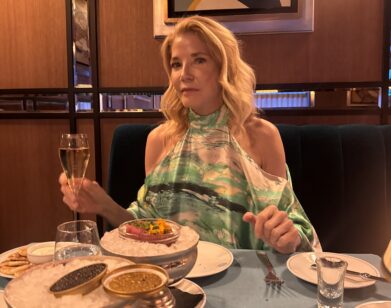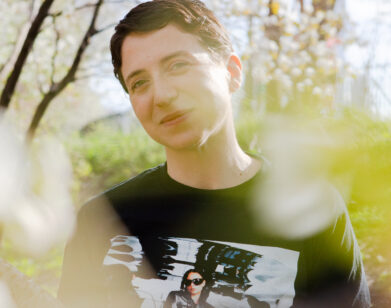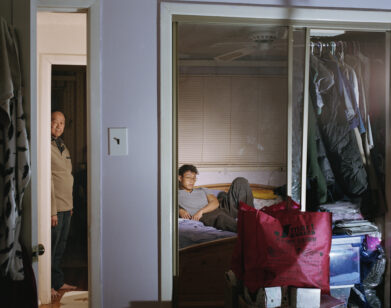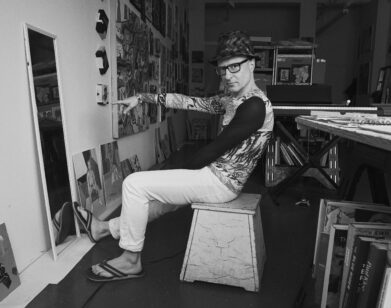R. Eric Thomas is Ducking Corners in Heaven
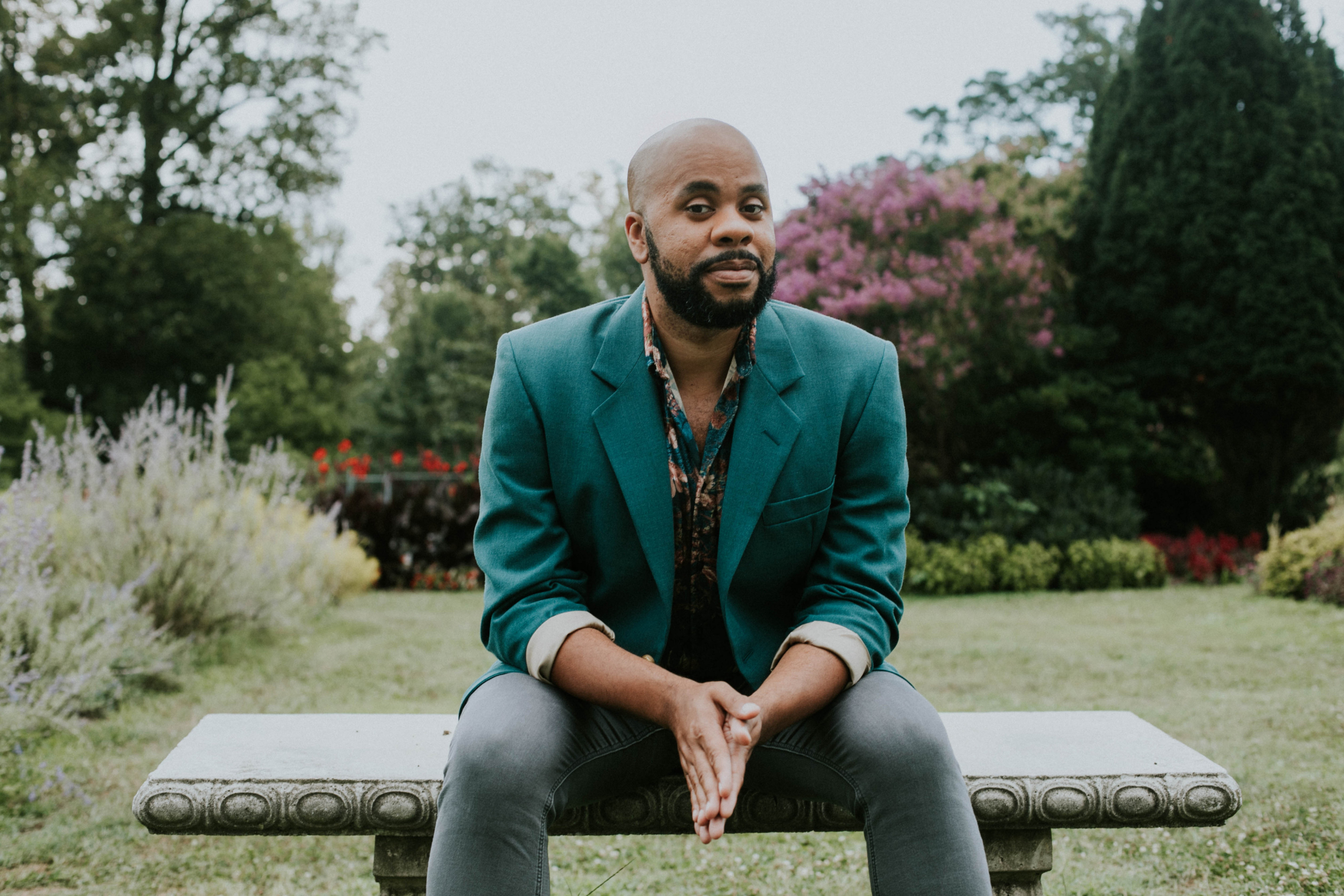
Photo by Katie Simbala.
The debut autobiographical essay collection of R. Eric Thomas, Here For It Or, How to Save Your Soul In America, is a quirky, funny, and deep meditation on being black and queer in America. With wit, introspection, and humor, Thomas writes about his upbringing in the Evangelical Christian community, going to a mostly white suburban high school, and getting unexpectedly catapulted to internet fame for writing about politics with his own column for Elle Magazine. Whether recalling the tragic end of the young girl he took to prom, telling stories of his family’s acceptance of his white pastor husband, or waxing poetic on time travel, politics, or pop culture, Thomas explores the feeling of otherness and how it led him toward deeper empathy and self-acceptance. Anyone who’s ever felt out of place will find a powerful guide in Thomas. Below, we spoke with Thomas about various topics chosen at semi-random—his and Gwyneth Paltrow’s alternate lives, libraries, justice, why the suburbs are terrifying, and what to expect in heaven.
———
Choose-Your-Own-Adventure Books
“I think it’s such a fantastic concept. I’ve never tried to write my own choose-your own adventure book. Maybe I should. They’re about consequence, which I think is so interesting. That’s what life is. We’re all like, if I go left, I do one thing. If I go right, I do another thing. It gives you this ability to have a little bit of power over consequence. I’m also really obsessed with time travel. It’s like that Gwyneth Paltrow movie Sliding Doors. I’m obsessed with the idea that our paths are not set, that we might have a little bit of control. As a queer person, I think about that a lot. Knowing being gay is not a choice, but there was a point in my life where I wasn’t out and now, every day in different ways, I come out. There was always this question of, what would my life look like if I was straight? What would I be doing?”
———
Being Other
“The idea of the other is such a fraught one. It’s so casually violent. I really wanted to take this opportunity in this book to hold that up to the light. There are so many parts of my identity that, in this specific American context I’m in, are minority identities. But I live my own story in the center of my own story. So, this idea I can go through life and be other everywhere I go is a malarkey. Who is defining the other? What is the purpose of othering and does it have any usefulness for me? I don’t think it does.”
———
“Make America Great Again”
“What’s so perplexing to me about a lot of the people who have latched on to this hateful narrative that has taken over our country is it’s all about clamoring. We have a president who is constantly aggrieved, even though he has a surplus of privilege. He’s arguably the most powerful man on earth, and yet he’s deeply unhappy and is constantly trying to one-up other people. That’s a bottomless pit. This idea that America was great at some point in the past, when all these people who were ‘other’ didn’t have a voice—I don’t think that’s true.”
———
Libraries
“What I love about libraries is that when you look at these cultural changes around the world, one of the things they do is denigrate education, and at a certain point, they start burning books. It’s because when you put your experience into a book, whether it’s a published book, or chap book, or diary, they have the power to illuminate new experiences. When you put it into writing, people can find it and realize, oh, I’m not the only person who has gone through this. Some of my earliest experiences in libraries opened me up to the idea that I wasn’t some freak. Reading James Baldwin or Toni Morrison or David Sedaris, assured me.”
———
The city vs. the suburbs
“The sound of a car alarm or a siren going off outside your house isn’t as scary as a forest with like random branches cracking. I appreciate nature; I’m now married to an Eagle Scout who likes to go out in the middle of nowhere. And I’m always like, well this is how it ends girl, you really did it. I love the vibrancy of cities and I like to go to a lake and look up at the stars. But people need to realize—you look at horror movies, the people who are being chased are being chased through woods, suburban houses, random fields, wherever Midsommar took place. They’re not going through my apartment building in the middle of a city with a doorman, okay?”
———
Justice
“I was raised by two people who believed in their inherent value and believed justice is possible. My parents were politically active in the ‘70s and some of my earliest memories are my mother contacting our local representative, which at one point was Elijah Cummings. That was a great example for me that you have to be engaged with your civic processes and civic leaders. A lot of that has to do with realizing who you are is valid and what you need is valid. We live in this bonkers time where people say ‘don’t bring politics into this,’ and I’m like, yo honey, I’m just talking about my marriage and my right to live.”
———
Religion
“Having so many questions and conflict between my religious upbringing as an Evangelical Christian and my identity as a queer person, the place where that story ends in the book with me marrying a pastor, it’s a little too perfect. It’s not something I sought out. I really had to untangle those threads and examine: What is sexual orientation to me, what is my relationship to a higher power, and what do I need from organized religion? All three of those things boiled down to me wanting to be in a community. I was sitting in church one day and I had this realization that we were all worshipping god, and every single person’s idea of what god was was absolutely different. I’m deeply affected by the feeling I get when I’m overwhelmed with humanity and people trying to access a different part of their lives all around me. I think it’s just so, so incredible, and I think we can achieve moments of heaven on Earth if we let ourselves be open to the idea that everybody around us is so deeply valuable and has so much potential for something divine.”
———
Heaven
“There’s a narrative in a lot of Evangelical communities about heaven being this kind of gated community. I don’t believe in hell, so everybody’s in heaven. But I don’t want to hang out with everybody on Earth. I don’t want to know everybody I know. So, heaven is going to be a lot of me ducking around corners. Like, oh, is he gone?”

